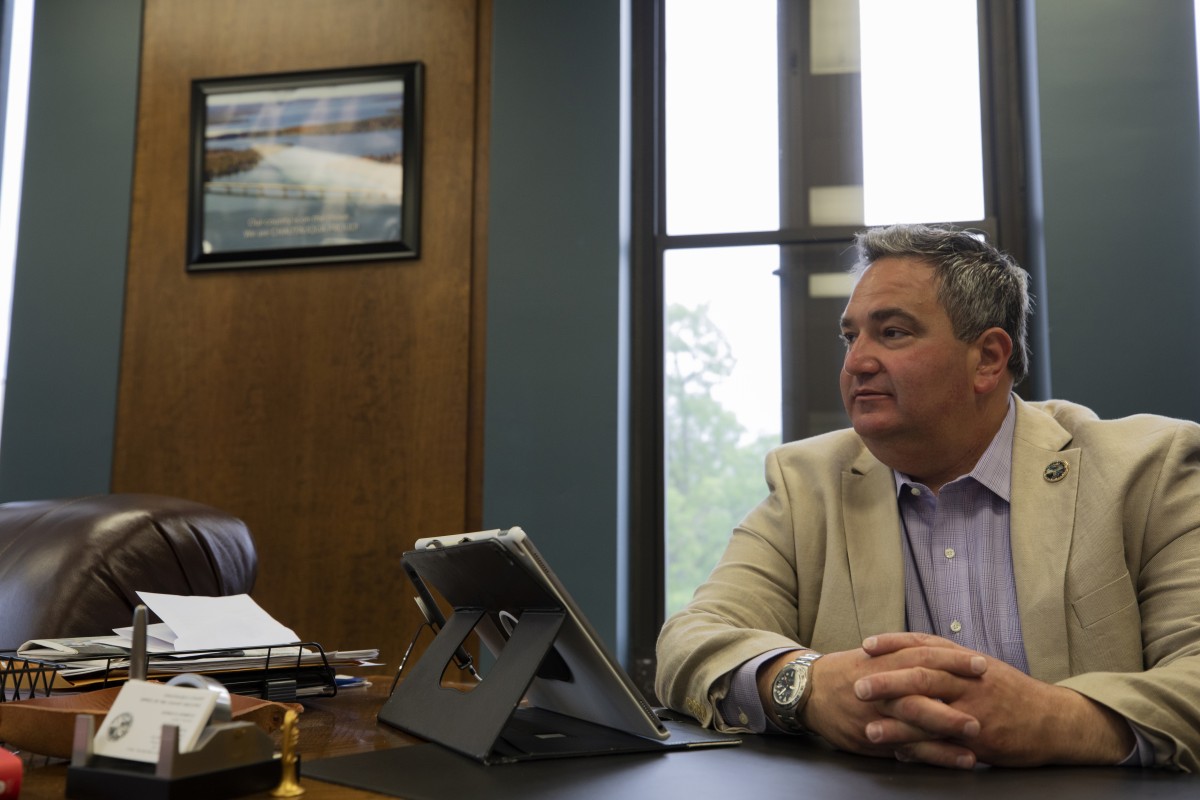George Borrello was elected Chautauqua County executive last November after eight years in the county legislature representing the Silver Creek area. A Chautauqua County native and retired successful businessman, Republican Borrello projects an easy assurance and congeniality. He strongly believes in the application of successful business principles to government.
There is no question, however, that Borrello recognizes the importance of the Institution in county affairs, tourism and economic development. He and Institution President Michael E. Hill have frequently conferred and are building a fruitful collaborative relationship. And the new county executive has also appeared at several off-season Institution programs aimed at strengthening ties with the surrounding community.
As he had pledged to do during last fall’s campaign, Borrello launched an effort to visit at least 100 county businesses in his first 100 days and has developed several intriguing business development ideas for the county, which has been ranked as the ninth poorest and most agricultural in New York state. We spoke recently in his corner office in the Gerace Office Building in Mayville. The first part of the conversation appears today. Tomorrow, the Daily will feature a second part of the conversation, focused principally on Chautauqua Lake.
George, could you talk about your background and career in Chautauqua County?

I grew up in Silver Creek and Fredonia, attended public schools there and went off to college at Purdue University. I got a degree in applied business economics there. Shortly after college, I started a company providing products and services to the hospitality industry. It was called Top Shelf Marketing. We created a variety of products, some of them pretty fun and innovative, especially in drinkware. I merged my company with a firm in Connecticut called Specialty Glass Company and took over as vice president of marketing for the combined firm. Specialty Glass was a much bigger company, and I basically sold my company to them. The new company was a leader in the drinkware industry, and I was able to retire last year during the election campaign. We had over 200 employees and no long-term debt. I’m proud of that.
Here in Chautauqua County, my wife and I do run hospitality businesses in the Sunset Beach area along Lake Erie. We manage some rental properties. I’d say we generate about 200 W-2 forms each year. Most of our employees are high school and college kids in a largely rural area who otherwise might not have work.
What advice would you offer to your own Lake Erie area businesses?
I would strongly advocate for some of the things I have suggested elsewhere. First, I’d talk about workforce development, even though many of our own employees are seasonal. Infrastructure improvement would be a key. Pushing for dredging in the area would be critical. Marina and other operations are seriously hampered by sedimentary buildup. There is also a public safety issue; we have had some flooding which could be reduced by dredging.
I think I would also recommend looking into more public-private partnerships that could improve public access to the waterfront areas.
You visited 100 businesses.
Yes, actually I visited 107 businesses in my first 100 days.
Your report to the public on your visits was well received. What were your three major conclusions?
I want to say workforce, workforce, workforce. I want to talk especially about training. For two generations now, we have been telling young people they need to attend a four-year college and get a degree to achieve good pay and employment. That is simply not true. What we face now is that we don’t have enough qualified workers in this county for the jobs that are here. It’s not the manufacturing industry of our parents and grandparents.
I’ll bet a lot of Chautauquans inside the gates know that you need engineers, mechanics, welders, large equipment operators. It’s gotten to the point in the county that employers are poaching skilled workers from other local firms. That raises the cost of doing business: If you poach someone, you have to offer them more money.
So workforce is the No. 1 priority. That’s always the key issue for businesses looking to expand or relocate.
The next issue, for me, is controlling the message about our county to those who are outside the county. We have a beautiful place here. We have to change how others perceive us. Googling ‘Chautauqua County’ often reveals unpleasant things. But this is a great, affordable place to live with plenty of bodies of water, good schools, good people and good services.

The other great priority is the opioid crisis. At every business I visited, the big deal was getting workers who could show up to work every day and pass a drug test. These businesses find that people with addiction issues won’t stay long and won’t consistently come to work when they are on the payroll. The drug epidemic is not only a public health crisis but also an economic development issue. This is a massive, complex issue, and our county resources are limited. CAER, the Countywide Alliance for Enforcement and Rehabilitation, is an initiative designed to focus resources on information sharing and education. Especially education, because once an addiction is established, it proves tough to break.
I feel that my job is to change the narrative and change the focus. We spend a lot of money on economic development, but it’s mostly focused on creating new jobs. We need to fill the 767 jobs I found that are already available. The political narrative here has focused on jobs emigrating and companies failing, so let’s recruit new employers. That’s the wrong approach. The truth is that we don’t have the workforce to support new businesses. So we need to retain what we have and fill our current vacancies.
What role can the Institution play in this?
Well, I think the Institution could have a role to play in changing that narrative I was speaking about. We have some well-endowed foundations that are in the southern part of the county (Jamestown), and they put a lot of money into institutions and organizations. But there are a couple of areas where Chautauquans and even the Institution could help.
A key issue for me around workforce is technical and vocational training as a practical alternative to four-year college degrees. There’s a lot of foundation money out there if you want to go away and get a four-year degree. But what if you want to learn a trade? What if you are 35 years old and just lost your job at Sam’s Club and need to support your family? Suppose you want heavy equipment operator training but don’t have the $3,500 that it would cost. Creating a fund to help with tuition for displaced adult workers could help a lot. We’re working on that, but the Institution and Chautauquans could help support it once it is established.
A second way would be to assist an angel investment fund that I aim to establish. It would be focused solely on incubating new businesses or expanding an existing business. We would welcome participation by Chautauquans, either with contributions or serving on the board of such a fund.
This is the most heavily agricultural county in the state, yet there seems to be little discussion of promoting advances in that sector of the economy.
This is true. Our agricultural industry is divided. In the north, people are dirt farmers. They are in crops. In the south end of the county, you have dairy farmers. There are different challenges. In the north, we have the largest Concord grape growing area in the nation. That market is struggling because the sweet-juice market has faltered. The pushback against sugar is a big factor here.
But there are other crops that grow in that soil. One of these is hops. I want to create a specialty market for hops in the county. Craft breweries, as we know, are flourishing. There is New York state legislation designed to promote craft breweries. A new one is soon opening in Mayville. So crop substitution on some farms would move us ahead. An aggressive marketing program would help here.
You talk with passion about marketing. Is that where you are going to focus your attention as county executive?
I see myself as guiding the effort in marketing and public relations and our county brand. There’s an old saying in the business: ‘A rose by any other name would wither and die.’ I think it is all about the brand.
What’s the brand now?
It has actually been built substantially around the Institution, a world center of learning and discourse. We have promoted this heavily. Then there are our five lakes, our beautiful vistas. But in reality, to me, the image is different. I think our real image is of failed businesses and rural Appalachia. We have to upgrade that image.
I think outside Chautauqua’s gates and probably outside county government, most county residents don’t feel particularly confident. We buy the falsehood that there are no jobs here. We need to stop the negative generalities that I just don’t think are true.
You are familiar with the Institution’s collaboration with local public schools.
Yes, in fact, I just participated in the Battle of the Books.
How could that collaboration be expanded?
I see the collaboration increasing now. We could perhaps expand to include more of a novice group. I remember playing on the Amphitheater stage in All-County band. We spent the whole day on the grounds. My understanding is that most Institution programs are aimed at top music and arts performers. What if we broadened the reach, either in terms of ability level or even age? Our planning and economic development department could act as a liaison between the Institution and our 18 school districts.
(Chautauqua President) Michael Hill and I have discussed getting the Institution involved after the season on a public policy basis. Perhaps there could be a “meet the candidates night” for congressional candidates on the grounds. There could be a forum involving county legislators. It would be another way to bring county residents onto the grounds. There’s certainly a lot of political activity in the county, but there should be more of a public policy focus. It could start this fall.
From all indications, you and Michael Hill are developing a good working relationship.
Absolutely. I just spoke with him today. He was in my office recently. I’ve been in his house on the Institution grounds for dinner. He truly wants to turn Chautauqua’s gates into gateways. That to me is a wonderful thing. The Winter Village was a fantastic idea. But beyond just improving the image of the Institution in the eyes of the locals, there’s a great opportunity to leverage the assets that are there. I think that’s what he wants to do.
Look, there is a segment of the population on the grounds that just wants to go there and relax. I get that. They are busy in their home areas. But there are others there that want the outreach to the local community. I’m all for that, and Michael and I will work toward making that happen.




